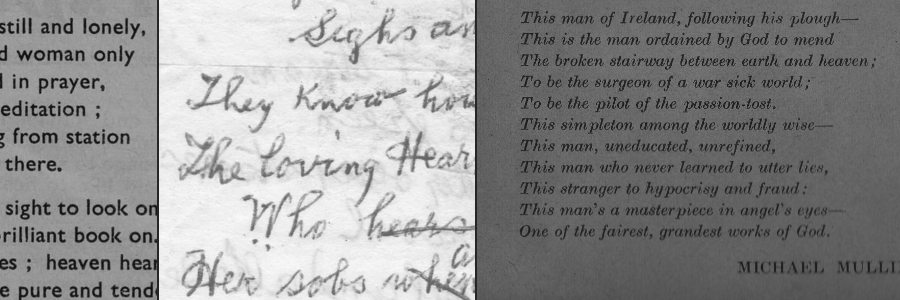Oh, the brown bogs of Ireland! the brown bogs of Ireland!
Fond fancy often wafts me o’er the intervening sea,
To the dear scenes of my childhood, to each soft vale and wildwood –
But the brown bogs of Ireland have a special charm for me.
Oh, the brown bogs of Ireland! the brown bogs of Ireland!
Full many a pleasant hour I passed upon the mountain’s heath,
While the Irish sun shone o’er me, and the moor-fowl fled before me,
As I roamed with dear companions, and surveyed the vales beneath.
Oh, the brown bogs of Ireland! the brown bogs of Ireland!
Now often in my day dreams in this city’s throbbing heart,
I forget its din and bustle, and I hear the heather rustle
In the wind, as o’er the mountain road I drive an Irish cart.
Oh, the brown bogs of Ireland! the brown bogs of Ireland!
I fancy here I listen to the mountain lark on high;
I see it skyward winging, and I hear its wild notes ringing,
And I watch it disappearing in the blue depths of the sky.
Oh, the brown bogs of Ireland! the brown bogs of Ireland!
The thought of them recalls me to a pretty girlish face –
Wistful eyes and wavy tresses, which the mountain wind caresses;
Oh! Kathleen, in my desert heart there’s still a verdant place.
Oh, the brown bogs of Ireland! the brown bogs of Ireland!
I’m weary of the city, with its wickedness and care;
I’m lone with thousands round me, for their cold looks only wound me –
Oh, the brown bogs of Ireland! I would that I were there.
Michael Mullin ‘The Bard of Foremass’
Foremass Lower, Sixmilecross, Co Tyrone.
Footnote: The following is an editors note printed with the poem: ‘Brown Bogs of Ireland’ breathes the true spirit of the Irish countryside and the longing of the city-dweller to be out on the moor and the mountain.
The bog of Altamuskin was a mountain bog – not a flat bog like the bog of Allen.
There’s a hill where the heather is growing,
And the white-headed ceanabhans nod;
Where the purest of breezes is blowing
The sweetest of perfumes abroad;
O! hill! where the curlews are screaming,
‘Tis long since I bade you good – bye.
There’s a glen where the green thorn is hiding
Beneath the white blossoms of June,
And a silvery streamlet is gliding
Along to a silvery tune;
O! glen of sweet-scented grasses!
That fall down the reaper before
O! glen of the hay-making lasses!
Shall ever I visit you more?
There’s a wood with a cot through it peeping,
There’s a garden where apple trees bloom,
And roses are shyly up-creeping
Towards a dear old-fashioned room;
O! well-beloved cottage and wildwood!
(O! rosy dreams withered and slain)
O! far away home of my childhood!
When, when shall I see you again?
Michael Mullin ‘The Bard of Foremass’
Foremass Lower, Sixmilecross, Co Tyrone.
Here in the city, gazing through a skylight,
I see far off a solitary star:
And fast my thoughts go speeding through the twilight
To pleasant Erin, where my loved ones are.
I see a cottage on a hillside quiet;
A little garden with its apple trees
Close by a haggard, and a turf stack nigh it,
A bed of flowers, and a hive of bees.
I hear a river to green meadows singing
A restful lullaby, a silvery song;
I hear the chapel bell – ‘tis Sunday-ringing;
I see upon the chapel road a throng.
I hear a curlew on the bog wind calling;
And moor-fowl whirring through the buoyant air;
I see a bog lark, like a star, down falling;
I feel the bog wind’s fingers in my hair.
I see the mountains all around me standing;
Green vales below me, and blue sky above.
I feel my spirit with great power expanding –
Great calmness and great freedom and great love.
But now my dream is ended, I am only
A lonely exile in a land afar;
Whose thoughts still hasten, when my soul is lonely,
To pleasant Erin where my loved ones are.
Michael Mullin ‘The Bard of Foremass’
Foremass Lower, Sixmilecross, Co Tyrone.
This poem is pre – 1916 after Patrick and John went to England – an exile point of view.


